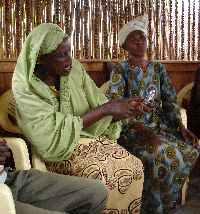Everyone is excited as we pile into the minibus that will take us to Rwinkwavu for day one of our focus groups. All of the ORI interns are coming along today so that we can make some final adjustments to our questions and techniques after the first day.
Our first session is with seven umudugudu chiefs and the Executive Secretary for the area. As soon as we mention that we plan to have a preschool in the center, they suggest that this preschool should serve as a training center for all the surrounding preschools. Each umudugudu has a preschool of its own, but the teachers lack training and materials. Using the RCLLC’s preschool as a training center is a fantastic idea. By providing training and loaning materials to the area’s preschools we will be able to have an impact on far more children.

A grandmother explains the need for reading glasses.
During our session with grandparents, we learn that most of the community members in this age group are not able to read and write. Of the seven grandparents at the session only one could read. The rest are all eager to learn, but they tell us that they and their peers will need reading glasses. This makes complete sense and I’m fairly confident it would never have occurred to us. Most of the residents of Rwinkwavu would not be able to purchase reading glasses for themselves. To enable the older generation to take advantage of all that the center will offer, we will need to keep reading glasses for loan.
We are all surprised when two separate groups of P6 students say their parents need training in family planning. They explain that many of their families are quite big and that their parents can’t afford to send all of their children to school. The students suggest that the center help educate their parents about family planning and the value of attending school.
The desire to learn English was voiced in every session. Focus group participants with some knowledge of English are eager to continue improving and those without any knowledge of English want to start with the basics. One of the grandmothers told a story of a time when a tourist asked her how to get somewhere. She understood the question, but was unable to communicate the necessary directions. This grandmother really wants to learn to give directions in English.
A lot of interesting ideas came out of the nineteen sessions. By the end of the last day, we had heard from a very interesting cross-section of the Rwinkwavu community. Everyone was incredibly cooperative and happy to help. The community members were all very appreciative that we had taken the time to ask for their input, and they can’t wait for the center to open.




